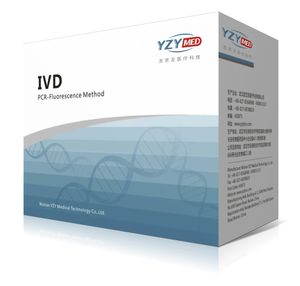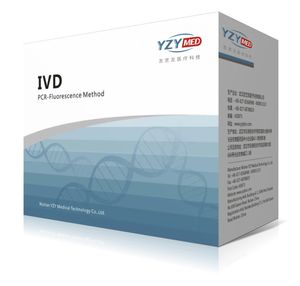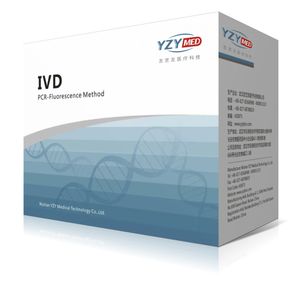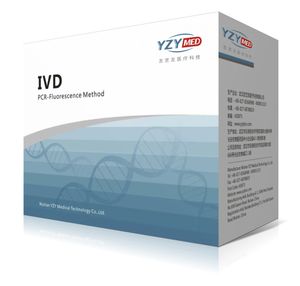
- Laboratory
- Laboratory medicine
- Lung cancer test kit
- Wuhan YZY MEDICAL Science and Technology
Lung cancer detection kit YZYMT-022 for genotypinggeneticFFPE tissues
Add to favorites
Compare this product
fo_shop_gate_exact_title
Characteristics
- Applications
- for lung cancer
- Application field
- for genotyping
- Tested parameter
- genetic
- Sample type
- FFPE tissues
Description
Human ROS1 gene fusion detection kit (PCR-fluorescence probe method)
This product is used for qualitative detection of formalin-fixed paraffin-embedded FFPE samples of non-small cell lung cancer (NSCLC) in vitro14 ROS1 genes in this RNA are fused (ROS1 gene Exon 32 (COSF 1260/1197/1203/1266/1279)Exon 34(COSF 1261/1198/1201/1280/1268)、Exon 35(COSF 1270/1274/1251)、Exon 36(COSF 1295))
ROS1 gene encodes a tyrosine kinase belonging to the class II RTK insulin receptor family. The ectopic expression of ROS1 and the variant activation of ROS1 kinase can be seen in many tumors, such as glioblastoma multiforme, non-small cell lung cancer and extrahepatic cholangiocarcinoma, showing that ROS1 kinase activation inducesabnormal proliferation and survival of cells. After the fusion rearrangement of ROS1 gene with SLC34A2, CD74, EZR and other genes, the tyrosine kinase region at the C-terminal of ROS1 protein will continue to activate, and continue to act on the downstream signal transduction pathways such as RAS-MAPK/ERK, PI3K/AKT/mTOR, JAK/STAT3, and then lead to cell carcinogenesis [1]. Studies have shown that ALK kinase inhibitors can inhibit the autophosphorylation of Tyr2774 site by competitively binding to ROS1 kinase binding region, thereby blocking the downstream signal pathway induced by ROS1 activation [2,3,4].
Catalogs
No catalogs are available for this product.
See all of Wuhan YZY MEDICAL Science and Technology‘s catalogsOther Wuhan YZY MEDICAL Science and Technology products
Tumor Targeted Companion Diagnostics(CDx) PCR Kit
Related Searches
- Assay kit
- Blood assay kit
- Molecular test kit
- Real-time PCR test kit
- Oncology test kit
- Tissue detection kit
- Genetic test kit
- Urine assay kit
- Oncology test kit
- PCR assay kit
- Real-time detection kit
- Obstetrical/gynecological test kit
- Genetic mutation detection kit
- FFPE tissues assay kit
- FISH test kit
- Microscope slide scanner
- Colorectal cancer test kit
- Lung cancer detection kit
- Genotyping detection kit
- Genomic test kit
*Prices are pre-tax. They exclude delivery charges and customs duties and do not include additional charges for installation or activation options. Prices are indicative only and may vary by country, with changes to the cost of raw materials and exchange rates.







